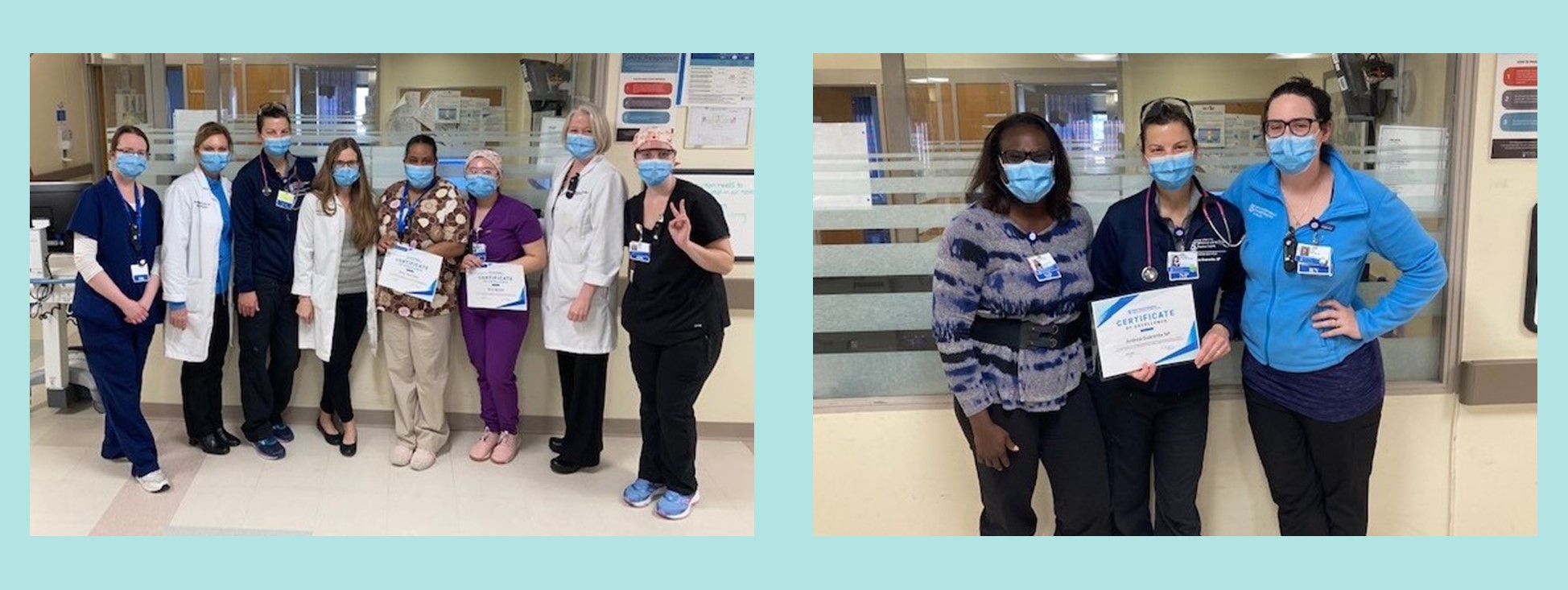
Mobility Rounding is a new quality improvement project on 7 North that aims to improve patient outcomes by reducing falls, pressure ulcers and deconditioning—all by simply getting patients out of bed. Twice a week, nursing leadership chooses two patients on the unit who need assistance with activities of daily life (ADL). At the bedside, providers, nursing leadership, staff nurses, PCAs, Clinical Leaders Jacqueline Dejean, BSN, RN, and Tracy Lane, MSN, RN, MEDSURG-BC, and the nurse educator all gather to discuss the patient’s medical indications for mobilization and make a plan to get the patient out of bed.
“We know that mobilization—whether it’s walking the hallway or simply sitting up in a chair—is key to a good outcome,” says Karen Jiang, MD, a hospitalist who represents the providers on the 7 North leadership team. “On surgical floors, particularly those with orthopaedic and urology patients, it’s part of the nursing staff’s standard workflow to get their patients out of bed early and often. But on a medical unit, where patients are very sick, it’s just not part of the culture. We’re trying to change that by reminding the entire care team of the importance of mobilization and breaking down any barriers they might face when attempting to get their patients out of bed.”
Vonette Anglin, MSN, RN, ANP-BC, who along with Dr. Jiang represents the providers on the 7 North leadership team, says, “I am most impressed with how nursing leadership has stepped up to lead by example. Our two nurse directors on 7 North have taken the lead when it comes to demonstrating tactics for getting patients out of bed and proved that it can be done, even with the most ADL-dependent patients.”
For the nursing leadership team, made up of Nurse Directors Juliet Gleason, MBA, MSN, RN, and Brenda Miele, MSN, RN, Mobility Rounds are a great way to help the nursing staff develop a plan of care. “Mobility is important to improve respiration, prevent complications of being in bed such as skin breakdown, deconditioning, delirium and blood clots, as well as speed rehabilitation,” says Miele. “Mobility is a priority on medical floors, however patients with complex medical issues can require multiple interventions to assist them in mobilizing. Once the patient is stabilized medically, mobilization is then the priority.”
Nurses caring for patients at the bedside have enthusiastically embraced Mobility Rounds. “There are barriers to mobility, such as patients refusing to get out of bed because they are not feeling well, organizing the team to assist the patient in mobilization and treatments and studies that may require patients to be off the unit,” explains Professional Development Manager for 7 North Susan Belton, MSN, BS, RN, CNL. “But the staff have been engaged and open to opportunities to learn where we can improve in patient mobility, increased knowledge of equipment and mobility orders. They also have a greater understanding post-COVID-19 of the importance of mobility, which has been a huge culture shift.”
Nina Nguyen, BSN, RN, says she has learned a lot about the different equipment used to get a patient out of bed. “Because of Mobility Rounds, I have started using the shuttle chair, the hovermat and the hoyer lift to help get my total care patients out of bed,” she says. “As a nurse, I am with my patients for the most time and have good knowledge about how well they move. It’s great knowing that we have had a decrease in falls on our floor and patients are not becoming deconditioned while in our care due to our efforts around mobilization.”
Josh Morey is a PCA on the unit. “Mobility Rounds have highlighted the importance of interdisciplinary communication and teamwork,” he says. “Mobility Rounds allow each participant to offer their own perspective on a given patient based on their experience with the patient as well as their role. The process allows participants to understand each other’s perspectives and how we can help each other to improve the patient’s mobility and the quality of their care/stay.”
To keep the momentum going, the project leaders have implemented a “Certificate of Excellence,” which is given out regularly to care team members who demonstrated a commitment to project. The first recipients were Betsy Jean-Gilles, PCA, Nguyen and Andrea Guarente, MSN, RN, MEDSURG-BC, FNP-BC, all of whom have consistently come to rounds on time and eager to participate.
Special thanks to Rose LaPlante, MBA, MSN, RN, Program Manager for Nursing Quality and Magnet, who helped with project design and data tracking.
Looking for more news from BWFH? Go to News to find articles about health, updates to our programs and services and stories about staff and patients.
Go to News